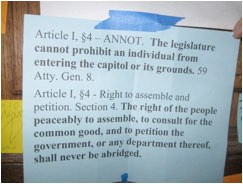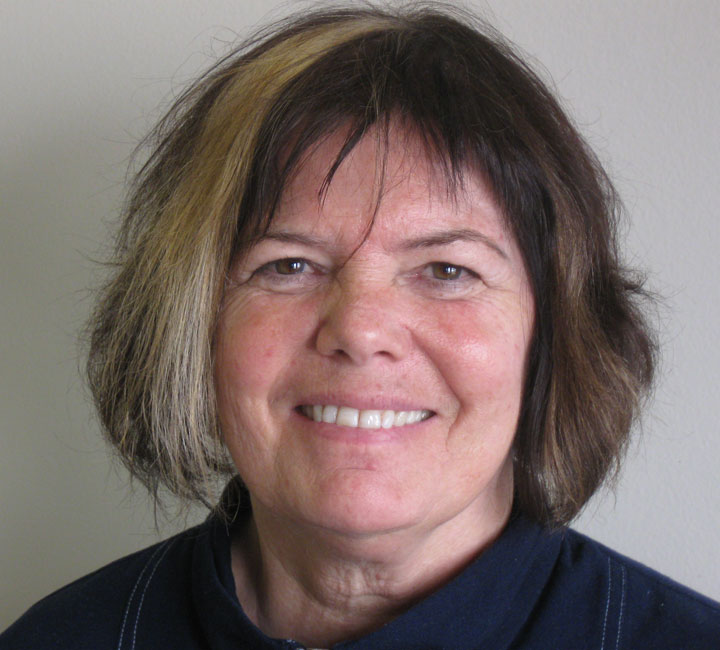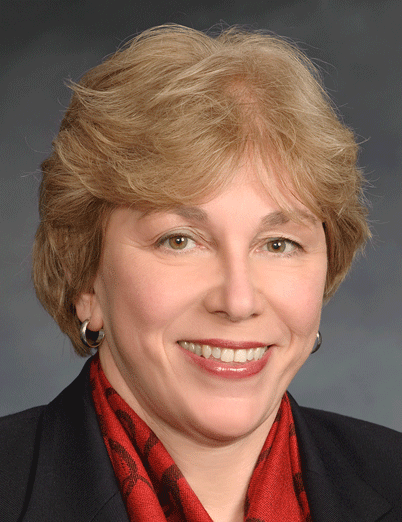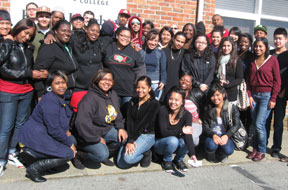Thousands rally at capitol against education cuts
by Elizabeth Terzakis, Cañada Chapter Co-Chair
Two hundred and fifty buses full of college students from all over the state of California converged on Sacramento on March 14 for the yearly March on March in support of public education. The stakes are particularly high this year, given Governor Jerry Brown’s proposed budget, which cuts spending for state universities and UCs by $1 billion and spending for community colleges by $400 million, guaranteeing both fee increases and a reduction in services.
 A crowd of some 5,000 stood in front of the capitol building in the pouring rain listening to speakers demand that Brown rethink his budget priorities and rescind the planned cuts. Representatives from different campuses called for the passage of the California Dream Act, an end to tax loopholes for the rich and corporations, and the opportunity to vote on an oil extraction tax—California is the only state that does not tax oil companies for extracting oil. Protesting students held signs saying “Tax the rich!” “Blame the bankers, not the teachers!” “Solidarity—from Sacramento to Madison with love” and “Support immigrant students—education for everyone!”
A crowd of some 5,000 stood in front of the capitol building in the pouring rain listening to speakers demand that Brown rethink his budget priorities and rescind the planned cuts. Representatives from different campuses called for the passage of the California Dream Act, an end to tax loopholes for the rich and corporations, and the opportunity to vote on an oil extraction tax—California is the only state that does not tax oil companies for extracting oil. Protesting students held signs saying “Tax the rich!” “Blame the bankers, not the teachers!” “Solidarity—from Sacramento to Madison with love” and “Support immigrant students—education for everyone!”
That this demonstration was only the beginning of the fight was made clear when a group of thirty students briefly staged a sit-in on the floor of the capitol rotunda, demanding to be allowed to enter the assembly chamber where their future was being discussed. State troopers moved quickly to block the entrance ways and keep out any additional protesters. They then told those sitting in that they would be arrested if they did not leave. The students decided to retreat, but promised to be back—and bigger.
Negotiations Update
Your AFT Negotiating Team has been working for more than a year to hammer out an agreement with the District. As you know, given the drastic state of funding to education, many school districts have taken drastic measures: furloughs, salary and/or step freezes, across the board salary cuts, such as at CCSF, and in the worst cases, layoffs. In our district, our part time instructors have experienced cutbacks to teaching loads and many have lost their entire assignments. We have lost some excellent colleagues, and our students have lost the opportunity to work with great teachers. What is happening to education in this country –and in our state — is shameful.
Throughout this long and still unresolved round of bargaining, we have tried to guard against any further damage to faculty and to the quality of the education we offer to students. At this point, we are still unable to report any details of our conversations at the table because we are still working with a state appointed Mediator. We are as frustrated as you must be, and we wish we could communicate more openly with you, but the rules of Mediation dictate that we cannot share any specifics — yet. We will continue to fight for the best possible agreement we can achieve. We are not giving in or giving up. Thank you for your patience and your hard work. As soon as we are able, we will send out an email communication and bring all of you into the conversation. Meanwhile, let your union reps know of anything going on in your workplace that is of concern, and hang in there. Let’s not let California become another Wisconsin.
In unity,
Joaquin Rivera, Chief Negotiator; Katharine Harer; Victoria Clinton & Sandra Raeber-Dorsett, Part-Timer Representatives
President’s Letter
Attacks on collective bargaining undermine a basic right for employees: a voice at work
by Monica Malamud, AFT 1493 President
 For several weeks now, we’ve been hearing the grim news about the Wisconsin Governor’s scheme to strip public sector workers, including faculty, of their collective bargaining rights. Unfortunately, similar legislation has been introduced in other states as well.
For several weeks now, we’ve been hearing the grim news about the Wisconsin Governor’s scheme to strip public sector workers, including faculty, of their collective bargaining rights. Unfortunately, similar legislation has been introduced in other states as well.
On the surface, proponents of these initiatives to do away with unions say that flexibility is necessary in order to deal with the current deficits. But the existence of unions and their right to negotiate does not stand in the way of finding solutions to the economic crisis. In fact, through the collective bargaining process, public employee unions in Wisconsin have offered concessions about their salaries and their contributions towards health care costs, in order to help the state deal with the budget deficit. Unfortunately, for Wisconsin Governor Walker this is not enough. Which points to the real motivation behind his proposal to disband unions, and similar proposals in Ohio, Florida, Michigan and New Hampshire: the goal is not “flexibility”, but rather absolute power for employers to make decisions unilaterally, without ever negotiating with employee groups.
Without collective bargaining employers have unlimited power
Collective bargaining does not give extraordinary powers to unions. Collective bargaining means that agreements are hammered out collaboratively between two groups: employers and employees. Those who would like to do away with collective bargaining say that unions have too much power. They’re actually right: in their opinion, unions have too much power, because any power that the union has means that employers cannot do as they please, so they would like to silence the voice of employees and give employers all of the power. With unions and collective bargaining rights, the power is fairly shared among stakeholders and the two parties must reach agreements, usually through compromises.
When compared to other countries, progress on collective bargaining rights in the United States has been slow but steady. Union membership in the public sector has been rising. We must continue to move forward, not backward, for the benefit of working people—the majority of the population. In fact, according to recent polls, a majority of Americans are opposed to the weakening of organized labor and the erosion of collective bargaining rights. The current attack on workers’ rights to form a union and to bargain collectively cannot be tolerated. Revoking these rights would erase decades of real progress for working people. Let’s stay informed and do everything we can to ensure that unions can continue to protect workers and be a force for social progress.
An interview with a Madison teacher
A personal view of Wisconsin teachers’ fight for collective bargaining rights
By Teeka James, AFT 1493 Co-Vice President, accompanying photos by Jennifer James
My sister and brother-in-law are secondary school teachers in the Madison Metropolitan School District. Jenny teaches art at an elementary school, and Bill teaches history at a high school. They also have two children: Tegan Anne, a kindergartner at a K-2 school and Henry, a fifth grader at a K-5 school. When I finally caught up with Jenny, she was parked in her driveway with her six-year-old daughter asleep in the back seat. They had been downtown for over six hours exercising their right to peaceably assemble and petition the government. The peaceably assembling part went well; petitioning the government, not so much. While Tegan slept, Jenny told me about her experience on the front lines of the Wisconsin public workers’ struggle to retain collective bargaining rights.
Jenny: It’s been nuts around here. I’ve been dragging the kids down to the capitol everyday this week. It’s been really cold, too, so there’s been lots of whining about cold feet.
 Teeka: What do the kids think about what’s going on?
Teeka: What do the kids think about what’s going on?
Jenny: Tegan loves it—she loves the drumming and the chanting! The first Wednesday—the first day I called in sick—Tegan and I went down to the capitol, and her teachers were there, too, so she was really excited to be there with them. Henry’s trying to figure it all out, so we’re talking about it at home pretty much nonstop. The district ordered us to not talk about it at all with the kids, so I’m not, but lots of kids have been going down to the capitol with their parents, and they’ve seen me and their other teachers down there, so the kids will say stuff to us, ask questions. It’s a balancing act to figure out how to deal with it. One kid in my classroom made a sign to take to the rally that afternoon.
Teeka: What’s the climate at your school? Are most teachers calling in sick?
Jenny: Well, yes and no. The teachers are not divided, which is good, but it’s really hard to keep up with it all; everything’s changing so quickly. When it all started and MTI (Madison Teachers Incorporated—the local union) called for the sick out, a lot of people didn’t know what to do. Bill and I went to work because we weren’t sure what it all meant—you know, what would happen if we called in sick, what to do with the kids. We wanted clarity. At my school, the staff met after school and decided to act together, but agreed that everyone would do what felt right for them and no one would pressure anyone else to demonstrate or not. Lots of us called in sick the next two days of that first week.
Teeka: So what happened at school? Did the district dock pay?
Jenny: Well, yes they say they are going to. Anyone who called in sick on those days has to show a doctor’s note; otherwise, they’ll lose a day’s pay.
Teeka: Do you normally have to show a doctor’s note when you call in sick?
Jenny: No! But there’s another problem (one of many!): the kids have missed several school days, which the district is going to have to figure out how to make up. They had only planned for one snow day, so I don’t know what they’re going to do. The thing is, to add days, the teachers will have to teach the kids—and so far the word is that the district will not pay the teachers for those days. Plus, we got docked for the sick days . . . people are really mad.
Teeka: Did Bill’s pay get d ocked, too?
ocked, too?
Jenny: Yes. Everyone’s did. Once people started calling in, the principals were ordered to check staff in twice a day. But it really depends on your principal what’s actually happening. My principal has us check in twice a day, but Bill’s is only making staff check in first thing in the morning. So Bill’s been checking in and then going down to the capitol at lunch time.
Teeka: So is anyone calling in sick anymore?
Jenny: I think some are, but most of us are teaching during the day and then dashing down to the capitol after school. MTI is trying to divvy up the district so we can keep a teachers’ presence down at the capitol but not have everyone getting burned out and impacting the kids too much. So each day different schools are designated to go to the rallies. MTI is sending out emails and all that electronic stuff telling us where to congregate, meeting points and times, that sort of thing. There’s a constant list of speakers.
Teeka: So what’s it like down at the capitol?
Jenny: Considering how fast everything’s had to happen, it’s pretty organized! At first the idea was to occupy the capitol to try to stop the votes from taking place. Some people did get in initially and stayed there for a few days—people were bringing sleeping bags, food, all sorts of stuff to help them. Early on at Bill’s school, when Jesse Jackson spoke at the rally, that morning he walked the teachers into work at East High School and then at lunch time, 800 students walked out and marched with Jesse Jackson from the school straight up East Washington all the way to the capitol—about two miles!—and occupied the rotunda. Bill walked with them during lunch and then went back to work. That was the beginning. The next day the sick out started. Bill’s school is mostly low income and African American; it was great to see the kids be such strong leaders in all of this.
Teeka: What’s the scen e at the capitol now? Is it still occupied?
e at the capitol now? Is it still occupied?
Jenny: Well, I’m not sure. I think some people might still be in there, but the governor closed the capitol building to the public, so we were all stuck outside. One issue is that folks are saying it’s illegal to close the capitol to the public. Walker called in all sorts of law enforcement, but of course many of them—especially the Madison cops, are with the teachers and the rest of the workers, so they refused to arrest people who were occupying the building. At one point, the Democrats from the Assembly brought their office desks outside onto the capitol lawn, saying that if Walker was going to close the building to the people that they would bring the government out of the building back to the people. It was pretty cool!
Teeka: What do you think will happen, Jenny.
Jenny: Well, the rumor at the capitol is that Madison will go on general strike. And if the city workers strike, MTI will be right behind them. If that happens, Bill and I will definitely walk. I think most of our staff will, too. But, what’s really going to happen is lots of people are going to lose their houses and their jobs.
Teeka: Have you already had furloughs and whatnot so far?
Jenny: No, we haven’t. And get this: the teachers voted and MTI had agreed that we’d put in more for health care and pensions in exchange for keeping collective bargaining rights. But Walker turned it down. Walker wants to up class size, get rid of art, music, PE, technology—all the stuff Madison’s been able to keep somehow. This is so totally not about money. He just wants to kill the unions.
Teeka: What would those pay cuts look like?
Jenny: I don’t have the details here, but I think Bill and I would each have to pay $500 per month total. That means we’d take home $1,000 less each month. I’m not sure how it all would work out with taxes and all, but that’s about a quarter of our total take-home pay.
 Teeka: Holy cow! That is a huge cut!
Teeka: Holy cow! That is a huge cut!
Jenny: I know. It’s just incredible! The MTI crisis committee is meeting tonight. A lot will depend on how the vote goes in the Assembly. What is so crazy to me is that it seems like the government has forgotten about the kids. Who is it that Walker thinks is going to want to be a teacher in Wisconsin after all of this? It’s just heart breaking. Tegan asked the other day why the governor didn’t like music. Henry answered her and said it was because his heart was all shrunk up like the Grinch’s!
Teeka: Well, there you have it. Spoken from the mouths of babes!
Jenny: I know. They see what the adults’ priorities are. They get it.
From the Part-Timer’s Perspective
The New Faculty Majority and SB 114
by Margaret Hanzimanolis,
AFT 1493 Part-time Faculty Organizer
Ed. note: This is the inaugural installment of “From the Part-Timer’s Perspective,” which will be a regular Advocate column by Margaret Hanzimanolis, AFT 1493’s new Part-time Faculty Organizer.
 The numbers are striking: Over half a million contingent faculty nationwide, tipping into the majority four or five years ago. In one of the wealthiest college districts in America, the numbers are, if anything, even more surprising: SMCCD is at a historic high point in its reliance on part-time faculty: 758 part-time faculty are currently teaching alongside 293 full-time faculty. While around 72% of the faculty in the district are employed on a part-time basis, a smaller proportion of classes are taught by part-time faculty members, currently 37%.
The numbers are striking: Over half a million contingent faculty nationwide, tipping into the majority four or five years ago. In one of the wealthiest college districts in America, the numbers are, if anything, even more surprising: SMCCD is at a historic high point in its reliance on part-time faculty: 758 part-time faculty are currently teaching alongside 293 full-time faculty. While around 72% of the faculty in the district are employed on a part-time basis, a smaller proportion of classes are taught by part-time faculty members, currently 37%.
In what other sector do part-time workers constitute the majority? No other public sector of the economy is so heavily staffed by temporary, part-time workers. You won’t find the first half of a 9th grader’s class taught by one part-time faculty and the second half by another. Your bus drivers, IRS personnel, Department of Motor Vehicles employees and college administrators are rarely temporary and virtually never part-time. To try to understand this labor anomaly, one must imagine college classes as “piece work”—and accept that what happens, what is meant to happen, inside the college classroom led by a part-time faculty member is, in some crucial ways, split off from the rest of the institution.
This sort of fragmentation is deeply damaging. When faculty members have weak institutional connections, when their class is a “piece” of work that is bounded by the start and the end of a class period, the educational transaction is damaged. Building strong cohorts of students, who are involved in and supportive of one another’s success, and led by faculty members whose institutional roots are deep, and who are fully integrated into all of the readiness and success support programs, is the best way to ensure high student completion rates. We need faculty to be strongly invested in the entire sweep of a student’s educational experience—from first contact to successful transfer or associate’s degree—not just in a semester-long set of discipline-specific outcomes.
This shift —from a faculty with strong institutional and student body connections to a faculty with weak institutional connections —has happened for obvious reasons: it’s cheaper and it’s more convenient for administrators to deal with a weakened faculty. Part-time faculty typically work on more than one campus or have other work jobs or family responsibilities, and usually can’t involve themselves in campus or departmental committee work, curriculum revision, technological innovation, advising and the informal contact students so urgently need, and a growing burden of administrative tasks overwork full-time faculty so that their institutional influence in program innovation, revision, and curriculum is flattened out.
But is it really cheaper? No, actually not. The administrative frictions of the constant turnover of part-time faculty, the keys and contracts, and last-minute schedule changes are costly. The low completion rates that are strongly correlated with reliance on an enormous, largely un-integrated faculty cadre, will emerge (once someone finally begins to track and analyze these kinds of data sets) as the most costly downside to the practice of the casualizing of academic labor at community colleges.
If community colleges are going to be funded, as many suggest will happen, on the basis of completion rates, the existence of these very weak connections between the large and growing part-time faculty cadre and the institution that has kept this enormous group of people at a deliberate distance from its core mission, will work strongly against those districts, campuses, departments and divisions that rely most on part-time faculty, and will most severely affect those institutions whose part-time faculty are most marginalized, most unfairly-compensated and most demoralized.
What hope is on the horizon? If we accept that the full integration of part-time faculty into the community college institutional culture is the key component to boosting completion rates, the most important initiative on the table now is SB 114, introduced by Senator Leland Yee, which would require parity in salary between full-time and part-time faculty and regularize the pension calculation formula, which currently disadvantages part-time faculty members working at more than one campus. (See article on next page.) This single initiative would go a long way towards fostering more meaningful institutional integration of part-time workers, the single largest drawback to this antiquated, unworkable two-tier system. More on SB 114, part-time professional development, national part-time and contingent faculty news, highlights of part-time contract provisions, re-employment preference lists, overload practices, opportunities for union involvement, SDI, unemployment compensation, health coverage in the coming months!
SB 114: Transparency in pay for adjuncts: An approach to achieving equal pay for equal work
by Judith Michaels, CFT Legislative Director
 San Mateo Community College district gives adjunct faculty no salary placement credit for advanced degrees or further professional development study beyond the required state minimum qualifications. This kind of denial of professional progress inhibits adjunct faculty from investing time and money in seeking higher degrees or furthering their professional training. If districts placed adjunct faculty on salary matrices that recognized this investment, these faculty would be encouraged to spend the time and money to further their professional growth.
San Mateo Community College district gives adjunct faculty no salary placement credit for advanced degrees or further professional development study beyond the required state minimum qualifications. This kind of denial of professional progress inhibits adjunct faculty from investing time and money in seeking higher degrees or furthering their professional training. If districts placed adjunct faculty on salary matrices that recognized this investment, these faculty would be encouraged to spend the time and money to further their professional growth.
Comparable salary schedules
SB 114 by State Senator Leland Yee (D-San Francisco), continues CFT efforts to help part-time faculty receive pay and benefits that are coherent with those of tenure and tenure track faculty by recognizing the need for community college districts to determine the compensation of part-timers using a salary schedule that places these faculty on comparable salary steps as full-time faculty with similar academic preparation and years of experience. That is, districts must develop a core salary schedule for faculty that is based on experience and education. If districts use more than one schedule, each cell on an additional part-time, adjunct salary schedule will be a locally negotiated percentage of each core salary schedule cell; in other words, part-time faculty are to be paid in a manner that mirrors the same relationship to the placement of full-time faculty on the core schedule.
Some locals in other jurisdictions, for example, the San Francisco Community College District, and the Los Rios College District, have already negotiated such schedules, under which districts compensate part-timers from a salary schedule that mirrors the full-timers schedule. The schedule has columns, which reflect increasing amounts of education, and rows, sometimes called “steps,” which reflect years of experience. In the interest of equity, SB 114 will create pressure to ask other districts to take this important step.
Reporting to STRS
Another feature of this bill will be to ask community college districts to report part-time faculty salaries to the California State Teacher’s Retirement System (CalSTRS) and to the affected employees as a percentage of full-time salary. The current variety of compensation methods makes comparisons about the status of part-time faculty very difficult and results in inequities in salary and service credit when districts report salaries to the State Teacher’s Retirement System based on classroom hours. Repeated problems have occurred, and continue to occur, with accurate calculation and reporting of service credits from districts to STRS and from STRS to part-time faculty members, with particular detriment to part-time faculty members who work in more than one district.
Additionally, whereas full-time faculty earn one year of service credit for teaching one school year, service credit for a part-timer depends upon the “full-time equivalent” (FTE) for each type of service rendered. Types of service may include credit classes, teaching noncredit (adult education) classes, substitute teaching, counseling, library duties, holding paid office hours, etc. Although San Mateo does not, many districts do use more than one FTE, depending on the adjunct’s assignment. Because of the difference between part-time and full-time salary schedules, and the disparity among districts, neither the individual faculty member nor STRS can easily determine individual accrued service credits. Errors are frequent because districts, especially those with a variety of hourly rate schedules, do not clearly relate part-time service to full-time service.
In 2009, the CFT sponsored AB 360 (Ma), which asked the retirement system to conduct a study to examine the feasibility of either creating a new program for part-time community college instructors or modifying current programs to make retirement benefits more equitable for part-time instructors. Although the bill stalled, STRS did establish a task force to address issues of inequitable retirement benefits for part-time faculty. CFT members serving on the task force include STRS Board Members Carolyn Widener, Phyllis Eckler, Ernest Kettering, Cliff Leihe, David Milroy, and Sam Russo. The task force will hear and debate three options developed by STRS at their March 15, 2011 meeting, with the thought that a coherent recommendation would go to the STRS board for adoption this year.
SB 114 will not conflict with this good work, and will be an important first step in helping community college districts to report part-time salaries consistently and assisting STRS in more consistent calculations when part-time faculty work in more than one district. Additionally, it is essential for our locals to put this issue on the table so that part-time and full-time salaries can become more coherent. The legislature has a long history of addressing the pay and workload inequities of part-time faculty. SB 114 will help districts and their faculty to remedy this situation by providing transparency so that the salaries of full-time faculty, and the salaries of part-time faculty performing a variety of duties that may have a variety of compensation patterns, can be more easily compared.
Highlighting Our Faculty
Skyline’s ASTEP Math Academy makes a difference in students’ lives to help them achieve academic success
“I am committed to my learning. I am responsible to myself, my classmates, my instructors and my community. I am worthy.”
– Skyline College ASTEP learning community affirmation (ASTEP = African-American Success Through Excellence and Persistence)
Skyline Math Professor Pat Deamer teaches students in the ASTEP Math Academy. Students in the ASTEP program include those who never considered college, have been homeless, are returning to school after years of raising a family, or are on court probation. For many of the students, someone told them that they are not college material, or they just never thought that they had the wherewithal to succeed in what they call hard subjects in a college. Yet these ASTEP students have been very successful!
 When asked what makes the program so special, students in an ASTEP Math Academy class immediately answered: “Momma D!” referring to Professor Deamer. But they also agreed that: “It’s like a family! Everybody really cares about each other and helps each other out. Like we’ll give each other rides or take care of each other’s kids or, if somebody doesn’t show up for class, we’ll find them and make sure they get here.”
When asked what makes the program so special, students in an ASTEP Math Academy class immediately answered: “Momma D!” referring to Professor Deamer. But they also agreed that: “It’s like a family! Everybody really cares about each other and helps each other out. Like we’ll give each other rides or take care of each other’s kids or, if somebody doesn’t show up for class, we’ll find them and make sure they get here.”
At the January 26 Board of Trustees meeting, Professor Deamer and Skyline Counselor Pauline Wethington delivered a compelling presentation about the impact that the ASTEP Math Academy has on the lives of students. The presentation described the effectiveness of the ASTEP model that integrates instruction with student services by having a counselor in some of the class sessions with the students and the instructor. Professor Wethington, who is referred to within ASTEP as the “case worker” for the students, provides complete counseling activities for students and whatever else they might need. She is often in the classroom with advice, scheduling, reminders of due dates for registering, student education plans, student success forms, etc. But in order to counsel students, she often has to schedule time in the office for confidentiality. There are also tutors in each class and there are tutorial times available outside of class twice a week for 3 ½ hours.
 Deamer and Wethington were accompanied by 16 ASTEP students who were all introduced to the Trustees. The students voluntarily expressed how this program has made a difference in their lives. They stressed that the program not only increases their success in math but it also increases their success in other areas such as Biology and English. Each of the students stood, stated their name, why the Math Academy is important to them and their GPA. They came with varied life stories and experiences. Though it is typical for others to classify many of the students as “at risk”, the students staked out a different identity. As they each spoke of their GPA, each of which exceeded 3.0, they claimed their identity, not as at-risk students but as scholars, destined to succeed because of programs like the ASTEP Math Academy.
Deamer and Wethington were accompanied by 16 ASTEP students who were all introduced to the Trustees. The students voluntarily expressed how this program has made a difference in their lives. They stressed that the program not only increases their success in math but it also increases their success in other areas such as Biology and English. Each of the students stood, stated their name, why the Math Academy is important to them and their GPA. They came with varied life stories and experiences. Though it is typical for others to classify many of the students as “at risk”, the students staked out a different identity. As they each spoke of their GPA, each of which exceeded 3.0, they claimed their identity, not as at-risk students but as scholars, destined to succeed because of programs like the ASTEP Math Academy.
The ASTEP Program was created for African-American and all Skyline College students to increase their chances of remaining in college. The program is designed for all students to be successful in completing an AA/AS degree, certificate, and to transfer to a four-year college or university. ASTEP Math Academy offers students an exciting and unique opportunity to select courses from an Afro-centric curriculum. The ASTEP components include core courses in English, Math, Career, Personal Development, African-American history, Black Psychology, African Diaspora and Tutorial Assistance, as well as mentoring, counseling and other support services.
 Professor Deamer, who has been teaching in the district for 36 years, further explained that “what makes ASTEP Math Academy different [from her previous teaching experience] is the fact that I have the students for three continuous semesters. I get to really know them. Pauline Wethington is the glue for ASTEP Math Academy. She has not only educated the students about college and college commitment but she has taught me about all of the necessary requirements that are demanded outside the classroom. The major effect of ASTEP Math Academy is that ‘WE ARE A FAMILY.’ I could say that about some of my students in the past because they are still in contact with me just like other professors on campus. But for the last four years being called MOMMA D is real.”
Professor Deamer, who has been teaching in the district for 36 years, further explained that “what makes ASTEP Math Academy different [from her previous teaching experience] is the fact that I have the students for three continuous semesters. I get to really know them. Pauline Wethington is the glue for ASTEP Math Academy. She has not only educated the students about college and college commitment but she has taught me about all of the necessary requirements that are demanded outside the classroom. The major effect of ASTEP Math Academy is that ‘WE ARE A FAMILY.’ I could say that about some of my students in the past because they are still in contact with me just like other professors on campus. But for the last four years being called MOMMA D is real.”
Some of the information for this article comes from an article published in Skyline Shines, produced by Skyline College President Regina Stanback-Stroud. Thanks also to Professor Pat Deamer, longtime member of the AFT 1493 Executive Committee, who contributed extensively to this article.
Introducing new AFT 1493 leaders
Rebecca Webb, CSM Part-Timer Rep.
Rebecca Webb became a CSM Part-Timer Co-Representative to the AFT 1493 Executive Committee last semester. We asked her to introduce herself to Advocate readers. Her introduction is below. -ed.
 I have been a part-time English Instructor at CSM for over five years and have been a college instructor for almost two decades. I also have two kids. I started teaching college English in 1994 while working on my M.A. at San Jose State University. As a Ph.D. candidate at Illinois State University, I taught English part-time as a graduate teaching assistant. During that time, the exploitation of part-time teaching labor as well as the increased dependence on adjunct instructors to teach the lower division courses became a national concern.
I have been a part-time English Instructor at CSM for over five years and have been a college instructor for almost two decades. I also have two kids. I started teaching college English in 1994 while working on my M.A. at San Jose State University. As a Ph.D. candidate at Illinois State University, I taught English part-time as a graduate teaching assistant. During that time, the exploitation of part-time teaching labor as well as the increased dependence on adjunct instructors to teach the lower division courses became a national concern.
Throughout my years as an instructor of English, I have watched the rapid decline of new full-time positions and the explosion of part-time, adjunct, temporary, and hourly lecturer labor in the profession of teaching. Now, I find myself in the thick of this dilemma trying to make a living, raise my kids, and fulfill my career goals of being an instructor of English. As your co-part-time representative, I am dedicated to improving the working conditions of part-timers in this district. It is my mission to, at a minimum, improve compensation and the quality of life of part-timer labor, and end the practice of solving the budget crisis on the backs of part-time labor. The profession of teaching is too important to the health of a free society to allow these continued abuses against teachers and the dismantling of our public schools.
AFT 1493 Executive Committee endorses Richard Holober for County Supervisor
At its December 2010 meeting, the AFT Local 1493 Executive Committee agreed to endorse Richard Holober, currently the President of the SMCCD Board of Trustees, in his campaign for County Supervisor. In the following article, Holober explains his candidacy. – ed.
I am very grateful that AFT Local 1493 has endorsed me for a seat on the San Mateo County Board of Supervisors. The Special Election is an all mail ballot election. Ballots should be filled out and returned promptly to ensure that they are received back by May 3.
I have been privileged to serve as a San Mateo County Community College District Trustee since 1997. Our colleges provide outstanding higher education and job training to tens of thousands of local residents, thanks to the dedication of our faculty and staff.
These are grim times for public education and for all public services. Our hard working faculty has stepped up at this time of need, doing more, with no additional compensation, to make sure that the doors to higher education remain open to our students.
I am not one who simply copes with the catastrophe that is undermining the American Dream. I’ve spent three decades working for social justice. As a union organizer for 20 years, and now as the head of a statewide consumer rights organization, I have fought for people who don’t have the advantages of wealth or insider connections.
When the minimum wage dropped to a 40 year low, I ran the 1996 campaign that raised the pay of two million Californians who labored in poverty. I have worked with the CFT in coalitions to end the tyranny of the small minority of reactionaries at the state Capitol. I signed the Yes on Prop 25 official ballot statement, which won voter approval and established a simple majority for enactment of the budget.
We face an open assault on public sector workers, as evidenced by an extremist Wisconsin governor with an agenda that has nothing to do with balancing the budget. We must mobilize public opinion to make sure that professors, teachers, nurses and other public servants are not the scapegoats for the misdeeds of Wall Street.
These times demand leaders committed to a balanced approach to the budget, making careful reductions while insisting that the billionaires pay their fair share of taxes to maintain our social fabric. I ask for your vote this April in the Special Mail Ballot Election for San Mateo County Supervisor. Please visit www.holober.com to learn more.



 A crowd of some 5,000 stood in front of the capitol building in the pouring rain listening to speakers demand that Brown rethink his budget priorities and rescind the planned cuts. Representatives from different campuses called for the passage of the California Dream Act, an end to tax loopholes for the rich and corporations, and the opportunity to vote on an oil extraction tax—California is the only state that does not tax oil companies for extracting oil. Protesting students held signs saying “Tax the rich!” “Blame the bankers, not the teachers!” “Solidarity—from Sacramento to Madison with love” and “Support immigrant students—education for everyone!”
A crowd of some 5,000 stood in front of the capitol building in the pouring rain listening to speakers demand that Brown rethink his budget priorities and rescind the planned cuts. Representatives from different campuses called for the passage of the California Dream Act, an end to tax loopholes for the rich and corporations, and the opportunity to vote on an oil extraction tax—California is the only state that does not tax oil companies for extracting oil. Protesting students held signs saying “Tax the rich!” “Blame the bankers, not the teachers!” “Solidarity—from Sacramento to Madison with love” and “Support immigrant students—education for everyone!” Teeka: What do the kids think about what’s going on?
Teeka: What do the kids think about what’s going on? ocked, too?
ocked, too? e at the capitol now? Is it still occupied?
e at the capitol now? Is it still occupied? Teeka: Holy cow! That is a huge cut!
Teeka: Holy cow! That is a huge cut! The numbers are striking: Over half a million contingent faculty nationwide, tipping into the majority four or five years ago. In one of the wealthiest college districts in America, the numbers are, if anything, even more surprising: SMCCD is at a historic high point in its reliance on part-time faculty: 758 part-time faculty are currently teaching alongside 293 full-time faculty. While around 72% of the faculty in the district are employed on a part-time basis, a smaller proportion of classes are taught by part-time faculty members, currently 37%.
The numbers are striking: Over half a million contingent faculty nationwide, tipping into the majority four or five years ago. In one of the wealthiest college districts in America, the numbers are, if anything, even more surprising: SMCCD is at a historic high point in its reliance on part-time faculty: 758 part-time faculty are currently teaching alongside 293 full-time faculty. While around 72% of the faculty in the district are employed on a part-time basis, a smaller proportion of classes are taught by part-time faculty members, currently 37%. San Mateo Community College district gives adjunct faculty no salary placement credit for advanced degrees or further professional development study beyond the required state minimum qualifications. This kind of denial of professional progress inhibits adjunct faculty from investing time and money in seeking higher degrees or furthering their professional training. If districts placed adjunct faculty on salary matrices that recognized this investment, these faculty would be encouraged to spend the time and money to further their professional growth.
San Mateo Community College district gives adjunct faculty no salary placement credit for advanced degrees or further professional development study beyond the required state minimum qualifications. This kind of denial of professional progress inhibits adjunct faculty from investing time and money in seeking higher degrees or furthering their professional training. If districts placed adjunct faculty on salary matrices that recognized this investment, these faculty would be encouraged to spend the time and money to further their professional growth. When asked what makes the program so special, students in an ASTEP Math Academy class immediately answered: “Momma D!” referring to Professor Deamer. But they also agreed that: “It’s like a family! Everybody really cares about each other and helps each other out. Like we’ll give each other rides or take care of each other’s kids or, if somebody doesn’t show up for class, we’ll find them and make sure they get here.”
When asked what makes the program so special, students in an ASTEP Math Academy class immediately answered: “Momma D!” referring to Professor Deamer. But they also agreed that: “It’s like a family! Everybody really cares about each other and helps each other out. Like we’ll give each other rides or take care of each other’s kids or, if somebody doesn’t show up for class, we’ll find them and make sure they get here.” Deamer and Wethington were accompanied by 16 ASTEP students who were all introduced to the Trustees. The students voluntarily expressed how this program has made a difference in their lives. They stressed that the program not only increases their success in math but it also increases their success in other areas such as Biology and English. Each of the students stood, stated their name, why the Math Academy is important to them and their GPA. They came with varied life stories and experiences. Though it is typical for others to classify many of the students as “at risk”, the students staked out a different identity. As they each spoke of their GPA, each of which exceeded 3.0, they claimed their identity, not as at-risk students but as scholars, destined to succeed because of programs like the ASTEP Math Academy.
Deamer and Wethington were accompanied by 16 ASTEP students who were all introduced to the Trustees. The students voluntarily expressed how this program has made a difference in their lives. They stressed that the program not only increases their success in math but it also increases their success in other areas such as Biology and English. Each of the students stood, stated their name, why the Math Academy is important to them and their GPA. They came with varied life stories and experiences. Though it is typical for others to classify many of the students as “at risk”, the students staked out a different identity. As they each spoke of their GPA, each of which exceeded 3.0, they claimed their identity, not as at-risk students but as scholars, destined to succeed because of programs like the ASTEP Math Academy. Professor Deamer, who has been teaching in the district for 36 years, further explained that “what makes ASTEP Math Academy different [from her previous teaching experience] is the fact that I have the students for three continuous semesters. I get to really know them. Pauline Wethington is the glue for ASTEP Math Academy. She has not only educated the students about college and college commitment but she has taught me about all of the necessary requirements that are demanded outside the classroom. The major effect of ASTEP Math Academy is that ‘WE ARE A FAMILY.’ I could say that about some of my students in the past because they are still in contact with me just like other professors on campus. But for the last four years being called MOMMA D is real.”
Professor Deamer, who has been teaching in the district for 36 years, further explained that “what makes ASTEP Math Academy different [from her previous teaching experience] is the fact that I have the students for three continuous semesters. I get to really know them. Pauline Wethington is the glue for ASTEP Math Academy. She has not only educated the students about college and college commitment but she has taught me about all of the necessary requirements that are demanded outside the classroom. The major effect of ASTEP Math Academy is that ‘WE ARE A FAMILY.’ I could say that about some of my students in the past because they are still in contact with me just like other professors on campus. But for the last four years being called MOMMA D is real.” I have been a part-time English Instructor at CSM for over five years and have been a college instructor for almost two decades. I also have two kids. I started teaching college English in 1994 while working on my M.A. at San Jose State University. As a Ph.D. candidate at Illinois State University, I taught English part-time as a graduate teaching assistant. During that time, the exploitation of part-time teaching labor as well as the increased dependence on adjunct instructors to teach the lower division courses became a national concern.
I have been a part-time English Instructor at CSM for over five years and have been a college instructor for almost two decades. I also have two kids. I started teaching college English in 1994 while working on my M.A. at San Jose State University. As a Ph.D. candidate at Illinois State University, I taught English part-time as a graduate teaching assistant. During that time, the exploitation of part-time teaching labor as well as the increased dependence on adjunct instructors to teach the lower division courses became a national concern.